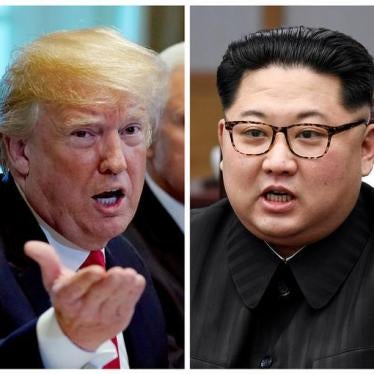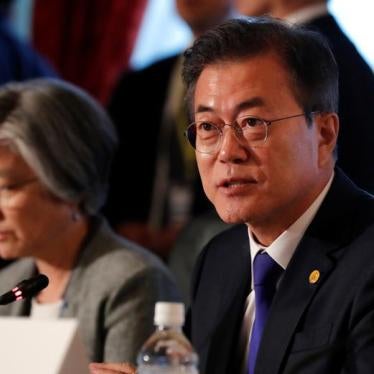North Korea is one of the world’s most repressive states. The government restricts all civil and political liberties for its citizens, including freedom of expression, assembly, association, and religion. It prohibits all organized political opposition, independent media, civil society, and trade unions. The government routinely uses arbitrary arrest and punishment of crimes, torture in custody, forced labor, and executions to maintain fear and control. In recent years, the government has tightened domestic restrictions on travel and unauthorized cross-border travel with China, and punished North Koreans making contact with the outside world.
In his seventh year in power, Kim Jong Un—the third leader of the dynastic Kim family and head of the ruling Workers’ Party of Korea (WPK)—continues to exercise almost total political control. North Korea’s firing of 23 missiles during 16 tests and its sixth nuclear test in 2017 sent tensions between the United States and its allies and North Korea to their highest level in decades. In 2018, Kim Jong Un engaged in new diplomatic efforts with South Korea, the US, China, Russia, and others. Between March and May 2018, Kim Jong Un, who had not met any world leaders since he came to power in December 2011, met twice with Chinese President Xi Jinping, twice with South Korean President Moon Jae-in, and once with Russian Foreign Minister Sergey Lavrov.
On human rights, the international community has continued to press the North Korean government to expand its engagement with United Nations human rights mechanisms, including action on the findings of the UN Commission of Inquiry (COI) report on human rights in North Korea that found the government committed crimes against humanity including extermination, murder, enslavement, torture, imprisonment, rape and other forms of sexual violence, and forced abortion.
On December 11, 2017, for the fourth consecutive year, the UN Security Council put North Korea’s egregious human rights violations on its formal agenda as a threat to international peace and security. On March 23, 2018, the Human Rights Council adopted without a vote a resolution that maintained pressure on the need for advancing accountability mechanisms for the eventual prosecution of North Korean leaders and officials responsible for crimes against humanity.
North Korea has signed and ratified several human rights treaties, including the Convention on the Rights of the Child (CRC), the Convention on the Elimination of All Forms of Discrimination against Women (CEDAW), the Convention on the Rights of Persons with Disabilities, the International Covenant on Civil and Political Rights, the International Covenant on Economic, Social and Cultural Rights, and the United Nations Charter, all of which obligate North Korea to cooperate with a variety of UN institutions and treaty bodies.
In 2017, North Korea undertook limited re-engagement with some UN human rights mechanisms, including the CRC and CEDAW committees, and with a short visit by the special rapporteur on the rights of persons with disabilities, a first for a UN thematic special rapporteur, although North Korea did not uphold its commitments to fully cooperate with her requests. The government continues to refuse to cooperate with the Office of the High Commissioner for Human Rights in Seoul and the UN special rapporteur on the situation of human rights in North Korea, Tomás Ojea Quintana.
Key Vulnerable Groups
In addition to the extensive abuses noted above, North Korea discriminates against individuals and their families on political grounds in key areas such as employment, residence, and schooling by applying songbun, a sociopolitical classification system that from its creation grouped people into “loyal,” “wavering,” or “hostile” classes. Pervasive corruption enables some room to maneuver around the strictures of the songbun system, and some people who bribe government officials are able to pursue market activities or travel domestically or abroad.
The government also fails to protect or promote the rights of numerous vulnerable groups, including women, children, people with disabilities, and people in detention and prison.
In addition to facing violations of their rights common to the rest of the population, women suffer a range of sexual and gender-based abuses as well. These include punishment for acts of their husbands or other relatives; torture, rape, and other sexual violence in detention facilities; sexual exploitation or forced marriage of North Korean women in China; and sexual and gender-based violence and discrimination. State authorities are sometimes perpetrators of abuses against women, and fail to offer protection or justice to women and girls facing gender-based and sexual abuse.
Gender-based discrimination appears to begin at childhood, where schools favor boys and men in leadership roles, and girls are socialized to stereotyped gender roles. Women are severely underrepresented in senior positions in the ruling Workers’ Party of Korea, which serves as the gateway to any position of power. There are no women on the all-important National Defense Commission or the Political Bureau of the Central Committee of the WPK, which determines the party’s policies. As of 2016, according to North Korea’s report to CEDAW, women made up only 10 percent of divisional directors in government bodies, 11.9 percent of judges and lawyers, 4.9 percent of diplomats, and 16.5 percent of officials in the Ministry of Foreign Affairs.
Border Tightening
Kim Jong Un’s government has bolstered efforts to prevent people from leaving North Korea without permission by increasing the number of border guards, CCTV cameras, and barbed wired fences on its border with China. Tactics include jamming Chinese cellphone services at the border and targeting those communicating with people outside the country. China has also increased checkpoints on roads leading from the border.
During the summer of 2017, Chinese authorities apparently intensified crackdowns on both North Koreans fleeing through China and the networks guiding them, resulting in fewer North Koreans being able to complete the arduous overland journey to Laos or Thailand, and from there, most often, to South Korea.
The Ministry of People’s Security classifies defection as a crime of “treachery against the nation.” Harsh punishments apply to North Koreans forcibly returned by China, including a potential death sentence. Former North Korean security officials and people who were forcibly returned after 2011 told Human Rights Watch that those forcibly returned face interrogation, torture, sexual violence, humiliating treatment, and forced labor.
The severity of punishment depends on North Korean authorities’ assessments of what returnees did while in China. North Koreans caught working or living in China are sent to different types of forced labor camps—long-term (kyohwaso) or short-term prisons (rodong danryeondae). Those discovered to be trying to reach South Korea are treated as enemies of the state and may disappear into North Korea’s horrific political prison camp system (kwanliso), where prisoners face torture, sexual violence, forced labor, and other inhuman treatment.
North Koreans fleeing into China should be protected as refugees sur place regardless of their reason for flight because of the certainty of punishment on return. China treats them as illegal “economic migrants,” and fails to meet its obligation to protect refugees as a state party of the 1951 Refugee Convention and its 1967 protocol. Beijing denies the staff of the UN refugee agency, UNHCR, permission to travel to border areas where North Koreans are present.
Key International Actors
South Korea’s Moon Jae-in administration has not made clear what its policy on North Korean human rights issues will be in the context of US-North Korean nuclear negotiations and the new diplomatic opening South Korea has with North Korea. Before the recent diplomatic flurry, key elements of its human rights policy included support for implementing the COI report recommendations; assistance for North Korean escapees detained in China and South Korean nationals detained in North Korea; regular publications on human rights conditions in North Korea; and the North Korean Human Rights Act that came into effect in September 2016. However, the South Korean government has yet to establish the North Korean Human Rights Foundation mandated by the act to conduct inquiries and develop policies on promoting human rights in North Korea.
In 2017, South Korea approved a US$8 million aid package for North Korean children and women at risk that will be distributed at an “appropriate time,” and monitored by UNICEF and the UN World Food Programme (WFP).
Japan continues to demand the return of 12 Japanese citizens whom North Korea abducted in the 1970s and 1980s. Some Japanese civil society groups insist the number of abductees is much higher. The Japanese government has expressed concerns about making concessions to North Korea before the abductees issue is resolved and commitments are made on key rights issues.
The US government has imposed many of its own bilateral sanctions on the North Korean government in response to its weapons proliferation activities, especially since 2006. In recent years, the US imposed several new rounds of sanctions for responsibility for human rights violations, formally determining that dozens of North Korean government entities and actors have been implicated in such abuses. In July 2016, and in January and October 2017, the US government imposed targeted sanctions relating to human rights abuses on ten institutions, including the Ministry of People’s Security, the Ministry of State Security, the Military Security Command (the military’s secret police), and the Ministry of Labor. The government also imposed sanctions on 25 North Korean government officials, including Kim Jong Un; Choe Pu Il, a senior official in the Ministry of People’s Security; Ri Song Chol, a senior official in the Ministry of Public Security; Kang Song Nam, a senior official in the Ministry of State Security; and Kim Yo Jong, Kim Jong Un’s younger sister and vice director of the party’s Propaganda and Agitation Department.
The US sanctions regime is now mandated under US law. In 2016, the US Congress also passed the North Korea Sanctions and Policy Enhancement Act, which obligates the president to investigate and list particular persons and entities involved in weapons proliferation, human rights abuses, and cyberhacking, and mandates the president to sanction them. The act also states that the sanctions may not be suspended unless North Korea takes major steps on ending weapons proliferation and related activities, as well as “accounting for and repatriating” citizens of other countries who were abducted by North Korea, “accepting and beginning to abide by internationally recognized standards for the distribution and monitoring of humanitarian aid,” and “taking verified steps to improve living conditions in its political prison camps,” among other criteria.
China is the most influential international actor in North Korea. Most of North Korea’s energy supplies come from China, and it is the country’s largest trading partner. China has more ability to pressure North Korea economically or on human rights, but it has never done so given its own weak policies on human rights, instead often closing the border to stop North Koreans from escaping, or returning those who entered China. Since May 2017, the Chinese government has agreed to enforce existing counter-proliferation sanctions more vigorously. There are also signs that China is more actively preparing contingency plans for refugee flight from North Korea. In December 2017, according to a leaked document from China’s state-owned telecommunications company, three villages in Changbai county and two cities in the northeastern province of Jilin bordering North Korea had been designated to have refugee camps built in apparent preparation for a possible surge of North Koreans escaping into China.









